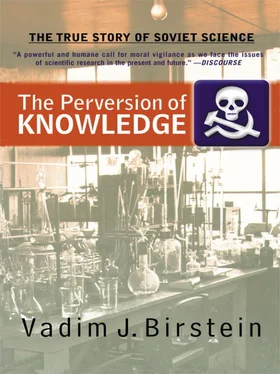Two scientific degrees, Candidate of Science (which is comparable to the American Ph. D.) and Doctor of Sciences, were introduced in the Soviet Union in 1934. A doctoral dissertation was theoretically a serious scientific contribution in the field of one’s expertise. In both cases, a dissertation volume was written. A candidate dissertation was reviewed by two prominent specialists in the field and by an independent institution. Three reviewers and an independent institution reviewed a doctoral dissertation. A dissertation was defended at a meeting of a special Scientific Council of the institute or university’s department. The defendant presented materials of the dissertation and answered questions posed by the reviewers and the audience. In the case of secret dissertations (like that of Mairanovsky), only specially selected members of a closed council listened to the defendant. After a successful defense and positive decision of the Scientific Council, the dissertation with all the materials describing the process of the defense was sent to the Highest Attestation Commission. The commission made its own independent review of the dissertation. If the dissertation met the criteria of the commission, it provided the defendant with the diploma of a Candidate or Doctor of Science, respectively. Usually a doctoral dissertation was written and defended by a person who was already a candidate. This system still exists in Russia.
The title of Mairanovsky’s dissertation was Biological Activity of the Products of Interaction of Mustard Gas with Skin Tissues . 3This dissertation included the results of experiments on humans. During later interrogations, Mairanovsky testified: “I did not use mustard gas on prisoners in the special laboratory. Substances similar to mustard gas [i.e., mustard gas derivatives] were taken internally with food. Experiments with mustard gas on the skin were not performed.” 4
It seems that Mairanovsky was a pioneer in experimenting with mustard gas on humans. His Nazi colleagues started their experiments with mustard gas on prisoners of the Sachsenhausen concentration camp in 1939 and also conducted experiments in the Natzweiler camp in 1942–1943. 5“Wounds were deliberately inflicted on the victims, and the wounds were then infected with mustard gas. Other subjects were forced to inhale the gas or take it internally in liquid form, and still others were injected with the gas,” a Nuremberg trial prosecutor stated in 1947. 6Several experiments were performed as well on women inmates of Ravensbruck. 7Japanese military researchers experimented with mustard gas on Chinese prisoners in 1940 and 1943. 8In the Natzweiler camp, the German research project even had a title similar to Mairanovsky’s— The Behavior of Yellow Cross [a synonym of mustard gas] in Living Organisms . 9At that time, Mairanovsky had already collected materials for his dissertation. In April 1944, after finishing their experiments with mustard gas on inmates of the Natzweiler camp, Dr. August Hirt, professor of anatomy at the Reich University of Strasburg, and Dr. Karl Wimmer, a Luftwaffe doctor, prepared their report Proposed Treatment for Combat Lesions from Mustard Gas for publication. 10By that time, Mairanovsky had already been conferred with the title of doctor as well as professor of pathology (Document 14, Appendix II).
After the war, on August 20, 1947, during the case against the Nazi physicians in Nuremberg, seven Nazi doctors were charged with conducting experiments with mustard gas on inmates at Nazi concentration camps. Of them, four were sentenced to death by hanging, one was sentenced to life imprisonment, and two were acquitted and freed. 11One of the acquitted physicians, Dr. Kurt Blome, was later recruited by the U.S. military and given a position as physician in the European Command Intelligence Center in Oberursel (Germany). 12Of two doctors who also experimented with mustard gas and tabun on inmates of the Natzweiler camp, Professor August Hirt committed suicide in 1945, and Dr. Wimmer was never persecuted after he handed over a detailed report about these experiments to American investigators. 13Not one of the Japanese scientists involved in experiments with mustard gas on humans was tried after the war. 14
In 1940, the Highest Attestation Commission did not approve Mairanovsky’s dissertation. The reason the commission gave was that Mairanovsky’s dissertation needed additional experimental research. In February 1943, Mairanovsky arranged for a letter from the NKGB commissar, Vsevolod Merkulov, to be sent to the commission. “Merkulov independently sent a letter in which he said that I had performed a number of assignments of significance to national defense at the Ministry.” 15“Yes, of course the letter helped him. The matter was put on the agenda again at the Presidium of the Highest Attestation Commission with Academician Speransky and Corresponding Member Grashchenkov in attendance and it was decided favorably for Mairanovsky.” 16The official documents at the Memorial Archive do not reflect this story, but it was documented in detail in Bobryonev and Ryazentsev. 17However, documents show that a meeting of the VIEM Scientific Council on October 20, 1943, approved Mairanovsky’s title of professor (Document 10, Appendix II).
Beginning in 1942, in addition to his experiments with poison substances, Mairanovsky had started to work on extracting “truthful testimonies” from interrogated victims. However, these experiments met with failure. Again, this was a complete parallel with his Nazi counterparts in Auschwitz. As Dr. Robert Lifton wrote in his research on the Nazi doctors, “there were other kinds of experiments at Auschwitz. These also combined certain official purposes with individual ‘investigative’ interests, including the use of drugs (probably mescaline, morphine and barbiturate derivatives) for purposes of extracting confessions, and the use of certain poisons.” 18
After the war, the CIA and the U.S. Office of Naval Intelligence obtained information about Nazi experiments with these types of drugs from one of I. G. Farben’s drug experts, Karl Tauboeck. 19He told Americans that the Gestapo and Abwehr had been looking for a truth drug consisting of barbiturates made from a plant extract. They planned to dope officers who had plotted to kill Hitler and force them to confess. According to Tauboeck, he failed to collect enough plants for the mission.
Mairanovsky was very disappointed with his “truth drugs” failure. As he wrote later (on October 17, 1951) in a letter to MGB acting minister Ogol’tsov, 20“I would like to propose further elaboration of my methods… in solving crimes by putting suspects into a “truth-telling” state… This had been approved by an authoritative commission appointed by Minister V. N. Abakumov and Generals Fedotov and Raikhman. For this work I was promised the Stalin Prize.” It was naturally very disappointing to miss a chance to receive the most prestigious Soviet prize.
In his memoirs, Sudoplatov claimed that during World War II Mairanovsky played an important role in the anti-German actions of Sudoplatov’s terrorist department. 21According to Sudoplatov, Mairanovsky put to sleep the Abwehr agents, who had been parachuted into the Soviet territory and came to secret “safe apartments.” While they were asleep, Mairanovsky supposedly exchanged the poison ampoules hidden in the collars of agents’ shirts with ampoules without poisons. This way the agents could not commit suicide when they were later caught by the Soviet secret service. It is unclear whether these apartments were in Moscow or somewhere else. Bobryonev and Ryazentsev mentioned that during the war Mairanovsky went to Tashkent, Chkalovsk, Kuibyshev, and Ulyanovsk. 22Perhaps these trips were connected with Mairanovsky’s service to Sudoplatov. Unfortunately, there is no way to check Sudoplatov’s description without access to the SVR and FSB archives.
Читать дальше











